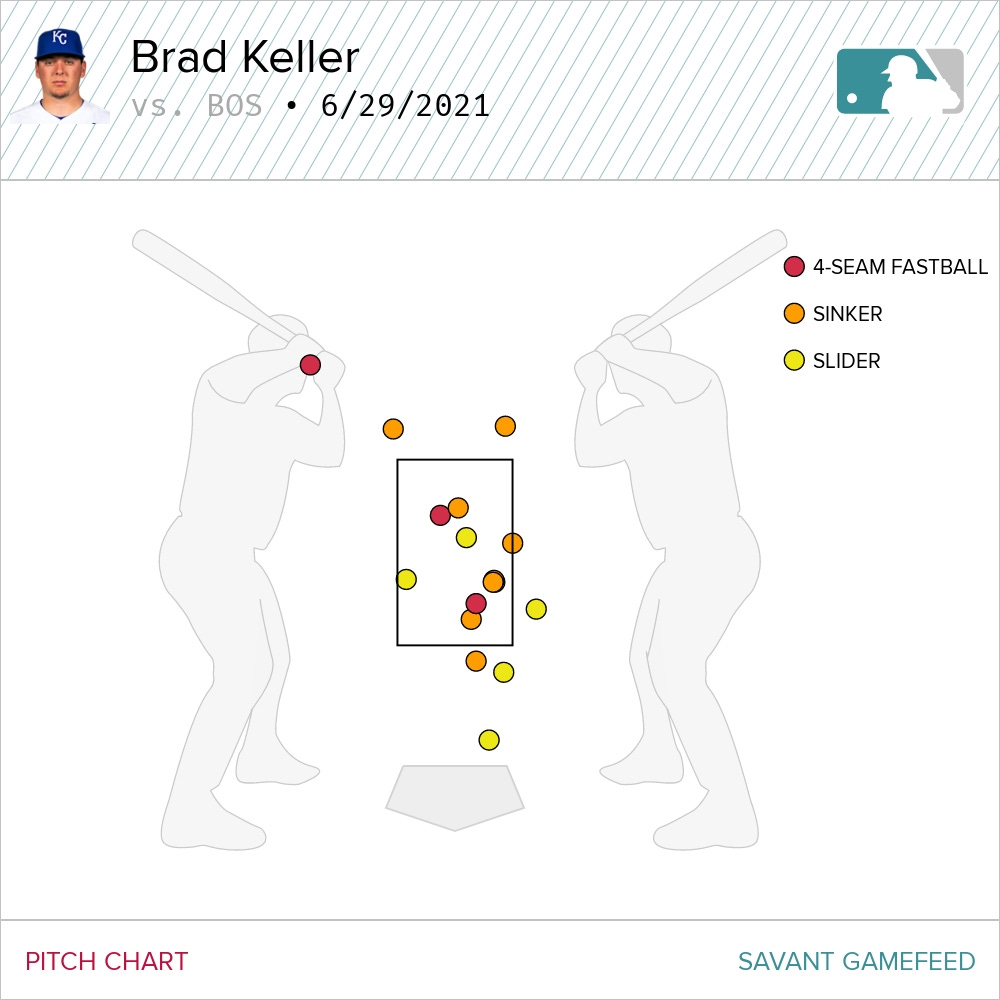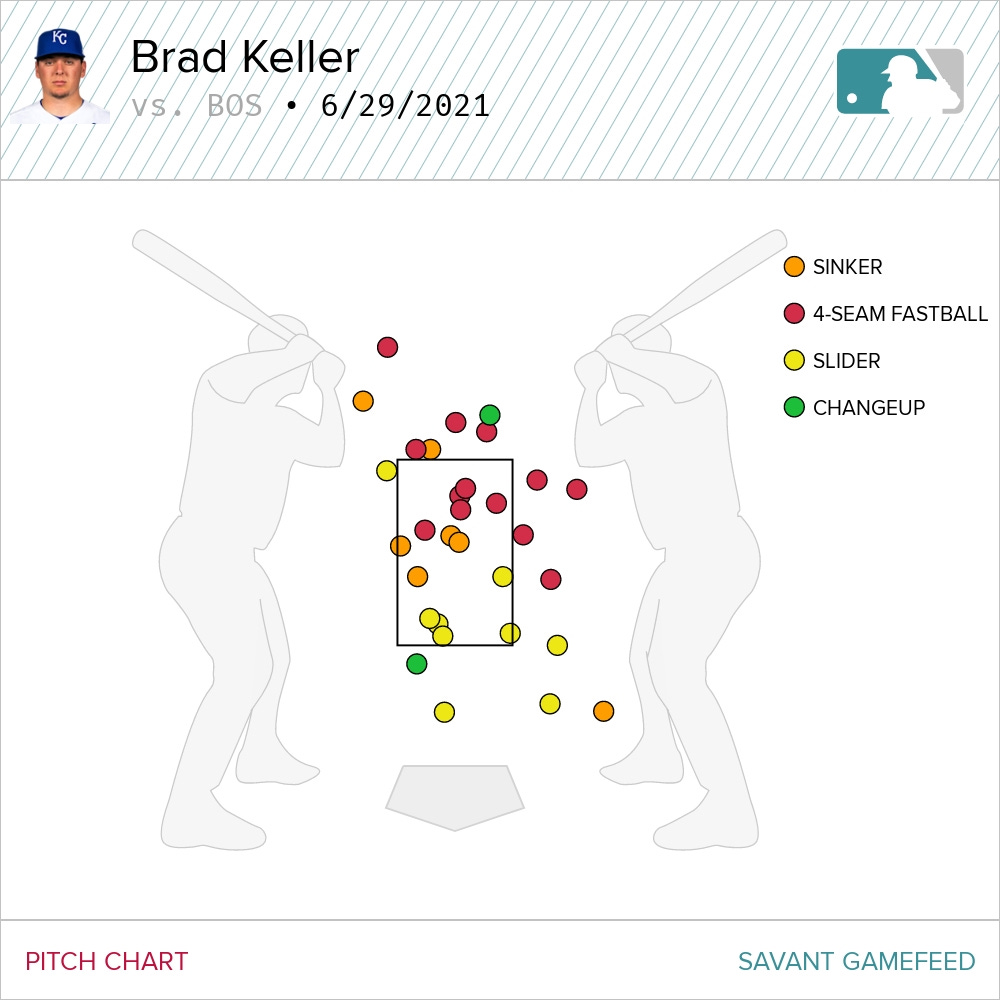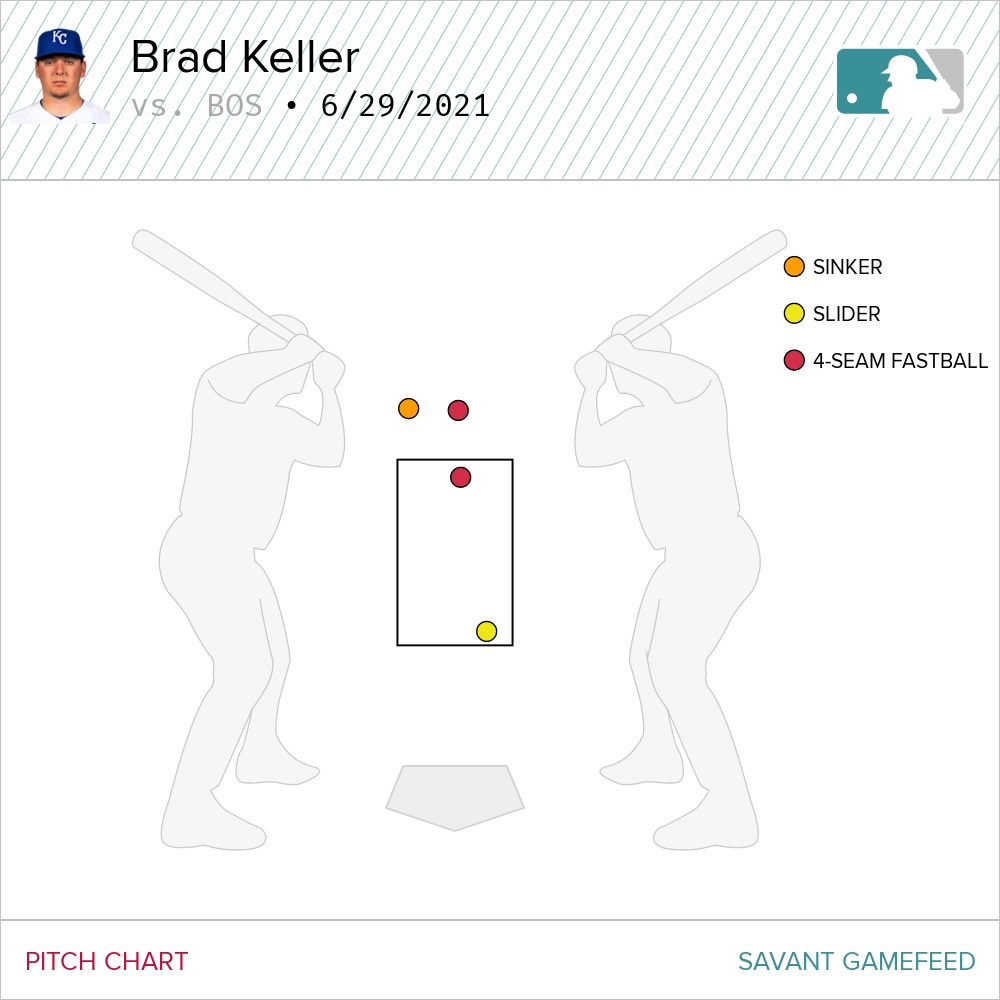Keller unable to deliver for the Royals
It was a semi-historic night in Boston. And not in a good way. The losing streak now stands at seven.
Do you play blackjack? What Mike Matheny did on Tuesday night was the equivalent of starting out with a 17 and asking for another card. He drew a two, which was amazing and wholly unexpected luck. But sitting on 19, he still wasn’t satisfied. Oh, no. Matheny tapped the table and asked for another card. Why, oh why would he do that?
For the next card, Matheny inevitably drew a ten.
That’s the only way I can explain what we saw in the way the manager handled Brad Keller in his start against the Red Sox on Tuesday night’s 7-6 loss. The Royals have now lost seven straight.
From the jump, one had the feeling this was going to be a typical Keller start. And when I write, “from the jump” I mean it in a very literal sense. Here’s the first pitch of the game from Keller.
Look where Salvador Perez set his glove, on the outside corner. Look where the pitch ended up.
When I was a kid, I went to a ton of games with my grandfather. He had a routine where if the first pitch of the game was a strike, he’d turn to me and say, “Good omen!” It was a fun little thing he did. He never said anything if the pitch was a ball. I have a feeling that if we had been at this game, he would’ve said, “Bad omen” with maybe one or two expletives thrown in.
Bad omen, indeed
Keller compounded his first inning troubles by allowing singles to the next four batters. Two of them were hard-hit. Two were not. Some were hit where fielders would normally be positioned. Some were hit into a perfectly aligned defensive shift. There was an error on a throw that allowed a runner to advance 90 feet at one point. And so it goes.
The hardest-hit ball of the inning was a ground ball to Whit Merrifield that started a merciful inning-ending double play. That Keller needed only 17 pitches to tiptoe around the carnage was impressive, but more a testament to hungry Red Sox hitters looking to feast on feeble pitching. They sated themselves on hanging sliders and an elevated fastball.
Keller gave up only two singles in the second, helped out by Bobby Dalbec making the third out of the inning at third base. The help was appreciated and later reciprocated.
That was Michael A. Taylor’s fourth assist of the year.
The singles bookended a pair of outs, so Keller only required 12 pitches to escape the second. A lot of elevated sinkers in that frame.
By this point, Keller had allowed seven base runners—six singles and a HBP. That he had allowed only two runs and the game was tied was a minor miracle. Perhaps, Keller would find a rhythm as the game entered the middle innings.
Not so fast!
That was a nice idea, but it quickly went by the wayside. The third inning was when Keller completely lost his feel on all pitches. After retiring the first batter, Keller uncorked 12 of his next 14 offerings out of the strike zone. Interestingly enough, the two strikes he recorded were on swings and misses. (More on that in a moment!)
This chart is a pitching coach’s nightmare fuel.
Of the 24 pitches Keller threw in the third inning, eight were strikes. That’s a 33 percent strike rate!
Keller rediscovered the zone in the fourth, but the Sox fired up the singles train, stringing together three consecutive hits to open the frame. Alex Verdugo then walked to plate another run. With the bases juiced and the dangerous J.D. Martinez up, Keller was able to coax a sacrifice fly. That seemed like the best-case scenario, getting an out in exchange for a run.
By the time the dust settled on the inning, Keller had delivered a whopping 32 pitches.
At that point, Keller had faced 22 batters and allowed 14 to reach base. A full 64 percent of Red Sox batters!
Maybe after reading all of the above, my blackjack analogy makes even more sense. Keller was awful through the first four innings. Dreadful. That he had allowed five runs and actually gotten through four frames was something of a tiny victory given the sheer volume of runners he was putting on base. That the Royals offense was seemingly up to the task and the team was trailing by just a single run was likewise a stroke of tremendous fortune. Keller had thrown 84 pitches to this point.
The Royals rallied once again in the top of the fifth, plating a pair of runs on a Ryan O’Hearn dinger to dead center. With a 6-5 lead entering the bottom of the fifth, you’re holding a 17 at the blackjack table. Don’t try to squeeze a little more out of that hand. It’s not a perfect hand, but the odds are in your favor if you just sit tight.
Yeah, it’s early but you don’t have a choice…you have to go to the bullpen.
Except, as you know by now, Matheny chose to try for a little extra.
And against all odds and everything we had seen through the first four innings, it worked! Keller walked the leadoff batter (naturally), but got a couple of soft ground ball outs and a lineout. Thirteen pitches, scattered all over the place, but enough elevated heaters and low sliders that he was able to get those precious outs.
Matheny hit on 17 and drew a two. That’s Ned Yost 2015 magic.
Finally, at 97 pitches, that should’ve been Keller’s night. Matheny got lucky that his starter was able to navigate five innings. But Matheny was stubborn. He just couldn’t get enough. He sent Keller out for the sixth.
Keller faced just one batter: Bobby Dalbec lined a single to left. Keller was done.
The damage was fatal when Dalbec scored on a Martinez double off Jake Brentz (along with Alex Verdugo who Brentz walked). The Sox held the 7-6 edge. There would be no more scoring on the night. The Royals lost their seventh in a row.
The aftermath
Here’s my question: Keller had littered the bases with Red Sox runners all night. Matheny immediately pulled him once a batter reached. Why send Keller back out there if that was the plan? The way things had gone all evening, there was no chance Keller would get through that inning cleanly. And
On the night, Keller threw 102 pitches. He generated just four swings and misses. Take a second to let that settle. Keller got just four whiffs on 102 pitches. He got just one whiff on his slider. The other three came on elevated fastballs, two on the four-seamer and one on the sinker.
According to data from Baseball Savant, it was the third-lowest percentage of swings and misses this year in a start where the pitcher threw 100 or more pitches.
It gets better! (I guess that all depends on your perspective.) Keller finished his night with 5 innings, 10 hits, five walks and, as you can probably imagine given the lack of swing and miss in his game on Tuesday, zero strikeouts. It was the 12th time in the expansion era (1961 to present) that a starting pitcher delivered a line like that. Somehow, four of them belong to Royals starters.
There’s no way to tapdance around what we saw on Tuesday: This was a historically poor start from a starter having a dreadful season.
Let’s give Keller the chance to assess his performance.
It was really hard to get a grip on the baseball. My whole uniform was soaked before the first inning even started. Which isn’t an excuse, but it was tough because I felt like rosin really wasn’t doing a whole lot and neither was the dirt…I got quite a bit of ground balls that found holes, especially early on…Not really that much hard contact all night. Just wish I had commanded down in the zone better.
It was definitely a hot and humid night in Boston. Keller said he could feel the pitches sliding from his hand on release. It impacted his sinker more than his slider or four-seamer, because of how he grips the pitch compared to the other two.
I’ll quibble on the “not much hard contact” thought, but it wasn’t like the Sox batters were getting an absurd amount of hard-hit balls. Ten of the 21 balls put in play had an exit velocity greater than 95 mph. That 48 percent hard-hit rate was above his seasonal average of 38 percent. The saving grace was the fact that Keller was mainly keeping the ball on the ground. He didn’t allow an extra base hit all night and was able to escape a couple of innings on double plays, which really minimized the damage.
Here’s what Matheny thought:
I know Brad was having difficulty holding on to the ball tonight. It ended up leading into some strange walks after he was pretty efficient. Overall, he came out aggressive and attacking the zone exactly like we wanted. It wasn’t necessarily in the bottom of the zone, but he was still…he was throwing a lot of strikes with the slider and with the fastball. Had trouble keeping it down, but it was a humid night, it was hard to keep the sweat from going on his hand.
Keller finished with a 20 percent CSW%, which is really poor. For the season, 61 percent of the pitches he’s thrown have been strikes. Sixty of his 102 offerings on Tuesday were strikes, so he was right in line with his seasonal average.
Along with all the talk of the “sticky stuff” pitchers have been banned from using, there’s also a continuing issue with the baseballs. Pitchers have been complaining that they’re often slippery, even in the best of conditions. I imagine it’s brutal on a hot and humid night with sweat running down your arm. As Keller said, rosin and dirt can only do so much to help with the grip. Nevertheless, this wasn’t a good performance from Keller.
Positive offense
Let’s end on a couple of positive notes.
O’Hearn has 11 hits in 33 at bats since his return from Triple-A with three home runs. He added a bomb to give the Royals their fifth inning lead.
In his last 28 games and 126 plate appearances, Whit Merrifield is hitting .350/.373/.542. He wrapped a leadoff home run around the Pesky Pole in right.
In addition to his outfield assist, Taylor had a three-hit game for the first time since Opening Day. He homered and stole a base as well.
Central issues
Minnesota 6, White Sox 7
Gavin Sheets singled, doubled and drove in two runs for the Sox in his big league debut. That’s allowed? Lucas Giolito went six innings of three-run ball. Josh Donaldson hit a home run in the first against Giolito and seemed to say something about the lack of “sticky stuff” as he crossed the plate.

I’m here for this.
Tigers at Cleveland — Postponed
The Royals have a five-game, a six-game and now a seven-game losing streak in June. They are 7-19 for the month.
Up next
Will the Royals ever win again? It’s up to Mike Minor. He squares off against Martín Pérez. First pitch is 6:10 CDT.















"Keller got just four whiffs on 102 pitches."
PITCH TO CONTACT!